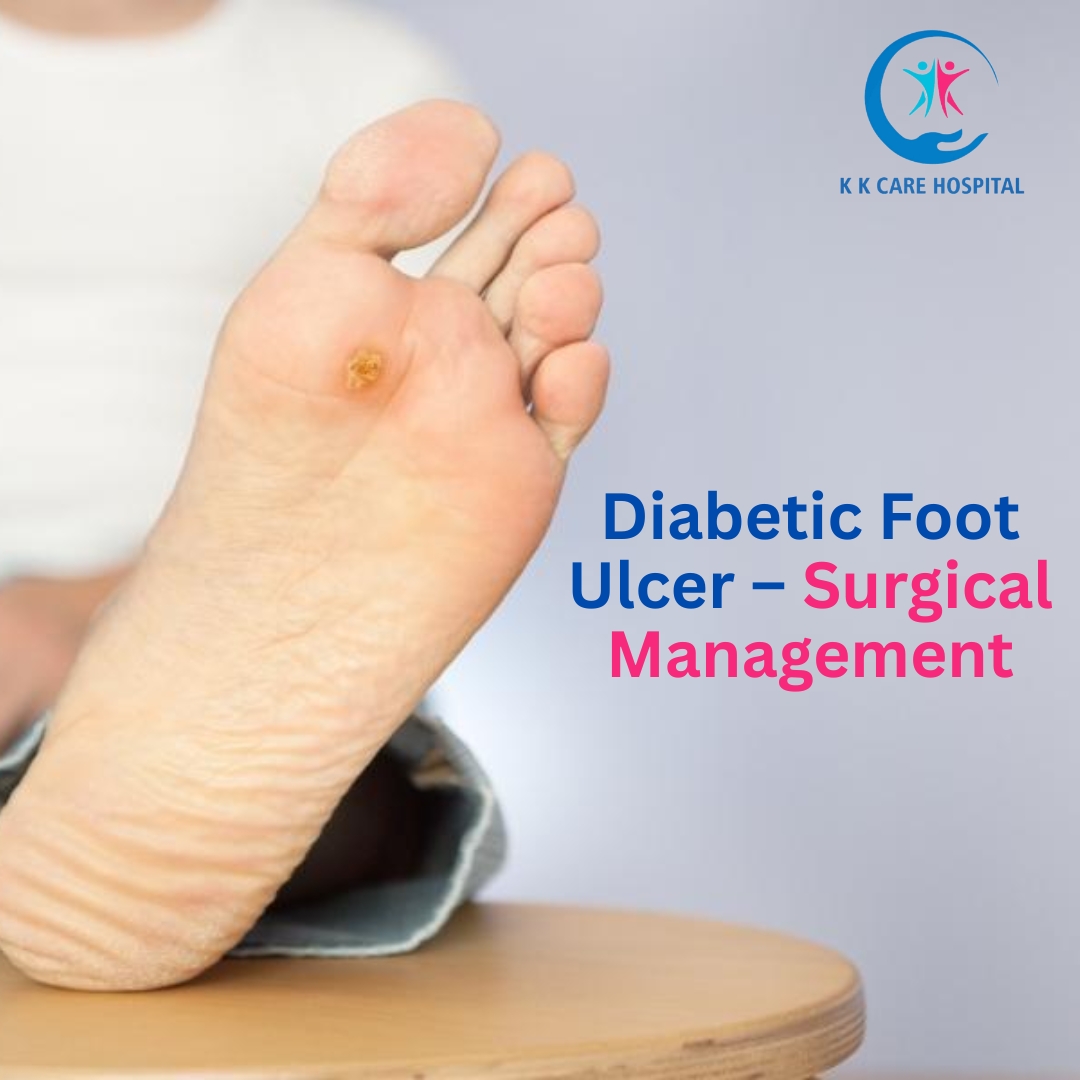Understanding Diabetic Foot Ulcers
A diabetic foot ulcer is a common yet serious complication of diabetes that develops when skin tissue breaks down, exposing the layers beneath. These ulcers often occur on the bottom of the feet and, if not treated promptly, can lead to severe infections, gangrene, or even amputation.
At KK Care Hospital, Charholi, Pimpri-Chinchwad, our team of experienced surgeons and diabetic care specialists provides comprehensive and advanced care for diabetic foot ulcers. Our focus is on early diagnosis, precise surgical management, and effective wound healing to restore foot function and prevent further complications.
🔍 What Causes Diabetic Foot Ulcers?
People with diabetes are more prone to foot ulcers due to a combination of factors, including:
- Peripheral Neuropathy: Nerve damage reduces the ability to feel pain or injuries in the feet.
- Poor Circulation: Diabetes affects blood flow, slowing wound healing.
- Foot Deformities: Calluses, corns, and pressure points increase ulcer risk.
- Infections: Small cuts or blisters can turn into ulcers if left untreated.
- Uncontrolled Blood Sugar: High glucose levels impair the body’s natural healing process.
Without proper care, even a minor wound can progress into a deep ulcer requiring surgical management.
⚠️ Signs and Symptoms of a Diabetic Foot Ulcer
Early detection is crucial to avoid complications. Watch for the following warning signs:
- Swelling, redness, or warmth in the foot
- Persistent pain or tenderness (or loss of sensation)
- Drainage or pus from an open sore
- Black or foul-smelling tissue (indicating gangrene)
- Non-healing wound for more than two weeks
If you notice any of these symptoms, consult a specialist at KK Care Hospital immediately for evaluation and treatment.
Diagnosis and Assessment
At KK Care Hospital, our doctors perform a thorough evaluation to determine the severity and depth of the ulcer. The diagnostic process may include:
- Clinical Examination: Assessing the wound’s size, depth, and presence of infection.
- Vascular Studies: To evaluate blood flow and detect blockages in the leg arteries.
- X-rays or MRI: To check for bone infection (osteomyelitis).
- Wound Cultures: To identify bacteria and select the most effective antibiotic treatment.
Once the condition is assessed, the surgical team creates a customized treatment plan for optimal recovery.
Surgical Management of Diabetic Foot Ulcers
When conservative treatments such as dressings, antibiotics, or offloading fail, surgical intervention becomes necessary. The goal of surgery is to remove dead tissue, control infection, restore circulation, and promote wound healing.
Here are the key surgical techniques performed at KK Care Hospital:
- Debridement
This is one of the most common procedures for diabetic ulcers. It involves removing dead or infected tissue to stimulate healing and prevent the spread of infection.
There are different types of debridement, including surgical, mechanical, and enzymatic methods, depending on the ulcer’s severity.
- Incision and Drainage
If an abscess or collection of pus forms, an incision is made to drain the infected fluid. This helps relieve pressure, reduce pain, and prevent deeper infection.
- Revascularization Surgery
In cases where poor blood flow delays healing, vascular or bypass surgery may be recommended to restore proper circulation to the affected foot. Improved blood supply significantly enhances recovery.
- Skin Grafting and Flap Surgery
For large ulcers that don’t heal on their own, skin grafts or tissue flaps are used to cover the wound. This helps protect underlying structures and speeds up tissue regeneration.
- Amputation (Last Resort)
In extreme cases where infection spreads to the bone and threatens the patient’s life, partial or complete amputation may be necessary. At KK Care Hospital, our surgeons aim to preserve as much of the limb as possible using advanced limb-salvage techniques.
Post-Surgical Care and Recovery
After surgery, proper wound management and follow-up are essential to ensure complete healing. Our post-operative care at KK Care Hospital includes:
- Regular Dressing Changes: Using sterile, medicated dressings to prevent reinfection.
- Antibiotic Therapy: To control bacterial infection and promote healing.
- Blood Sugar Management: Keeping glucose levels stable for faster recovery.
- Physiotherapy: To maintain mobility and prevent stiffness in the foot or leg.
- Customized Footwear: Special shoes or insoles to reduce pressure on healing areas.
Our team provides patient education on foot hygiene and preventive care to avoid recurrence.
🥗 Lifestyle and Preventive Measures
Preventing diabetic foot ulcers is always better than treating them. Follow these expert-recommended tips from KK Care Hospital:
- Inspect your feet daily for blisters, cuts, or discoloration.
- Wash and moisturize feet regularly (avoid applying lotion between toes).
- Trim nails carefully to avoid injuries.
- Avoid walking barefoot, even indoors.
- Maintain good blood sugar control through diet, exercise, and medication.
- Wear well-fitting, supportive shoes.
- Visit your doctor regularly for foot checkups.
With consistent foot care and timely intervention, you can significantly reduce the risk of ulcers and complications.
🏥 Why Choose KK Care Hospital for Diabetic Foot Surgery?
At KK Care Hospital, Charholi, Pimpri-Chinchwad, we provide comprehensive diabetic foot management under one roof. Our multidisciplinary approach combines the expertise of vascular surgeons, general surgeons, endocrinologists, and wound care specialists.
Our key strengths include:
- Advanced wound care and surgical facilities
- Skilled team with expertise in diabetic foot reconstruction
- Focus on limb preservation and early mobility
- Holistic management for diabetes control and prevention
We ensure that every patient receives personalized attention, timely intervention, and long-term support for a healthier, active life.
📞 Get Expert Care Today
If you or a loved one is suffering from a diabetic foot ulcer, don’t delay treatment. Early surgical management can prevent severe complications and improve outcomes.
Visit KK Care Hospital, Charholi, PCMC, or schedule a consultation with our expert team today.
👉 https://kkcarehospital.com/diabetic-foot-ulcer-surgical-management/






No comment